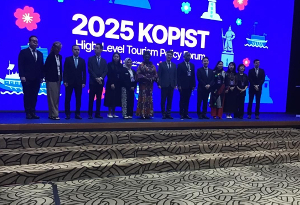The 2025 Korea Partnership Initiative for Sustainable Tourism (KOPIST) Forum, held in Yeosu, South Korea, on June 16, 2025, brought together officials from eleven countries under the theme “Fostering Regional Development through Ecotourism.” Participating countries included Azerbaijan, Bhutan, Ghana, Indonesia, Kyrgyzstan, Laos, Papua New Guinea, Peru, Tanzania, Uganda, and Vietnam.
Ghana was represented by Hon. Abla Dzifa Gomashie and her delegation from the Ministry of Tourism, Culture, and Creative Arts.
During the session on ecotourism development and sustainability, the Minister highlighted Community-Based Ecotourism (CBET) as a powerful tool for inclusive and sustainable tourism.
Citing the Boabeng-Fiema and Tafi Atome Monkey Sanctuaries, she demonstrated how aligning traditional beliefs with ecotourism fosters both environmental conservation and community development.
The Minister also outlined key best practices, including equitable benefit-sharing, capacity building, and community ownership and governance, emphasizing their role in promoting transparency, empowerment, and long-term sustainability.
The Minister also acknowledged ongoing challenges such as limited funding and socio-cultural tensions. She called for stronger coordination and inclusive governance frameworks to address these issues effectively.
In a panel discussion on the topic “Local Culture and Ecotourism,” the Hon. Minister emphasized the significance of local culture in enhancing ecotourism.
She highlighted Ghana’s efforts to integrate traditional dance, crafts, cuisine, and oral histories into tourism strategies. Further proposals included climate adaptation measures for coastal communities, academic partnerships for training tour guides, and youth engagement through social media to promote responsible tourism.
She also advocated leveraging cultural assets such as Kente cloth through UNESCO heritage sites to both boost tourism and preserve Ghana’s cultural identity.
Ghana’s participation reaffirmed its leadership in advancing community-led, culturally grounded, and environmentally conscious tourism. The forum fostered collaboration and shared learning among KOPIST countries in pursuit of sustainable tourism development.
On the second day, the Hon. Minister embarked on a guided tour of key ecotourism sites in Suncheon, including the Suncheonman National Garden, the Suncheon Garden Worcation Center, and the Suncheonman Wetland featuring expansive tidal flats and reed fields.
The visit offered valuable insights into Korea’s innovative approaches to ecological conservation, sustainable tourism, and the integration of nature with community-centered experiences.
KA



